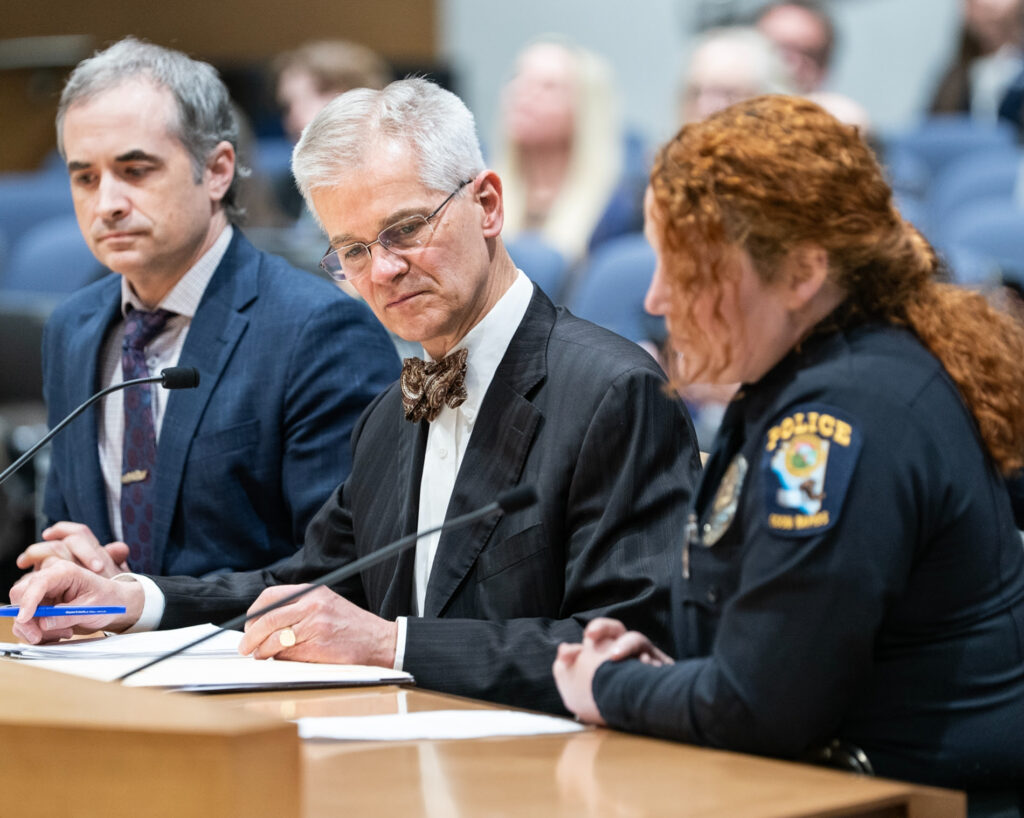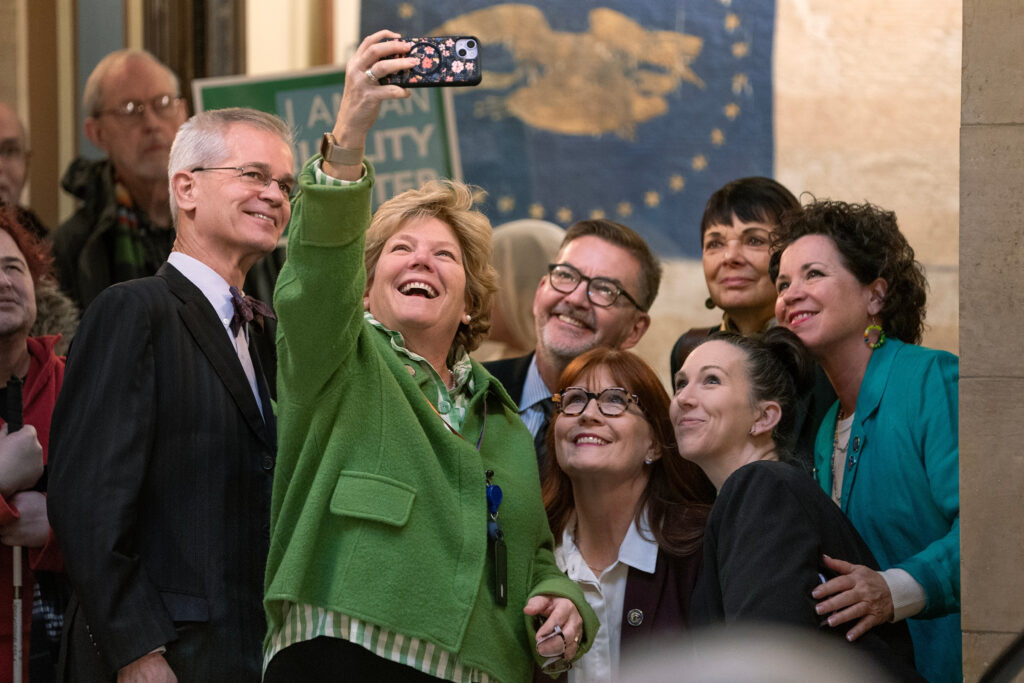Friends and Neighbors,
As promised, here is my 2025 session report, sharing perspectives on some of the issues and legislation I worked on.
The State Budget
The 2025 session occurred at a challenging time for setting a new state budget. Following the significant work accomplished by the 2023-24 legislature, this session involved a struggle to preserve those gains.
As Finance Chair, I was involved in the negotiations between the Senate, the House, and the Governor to develop the new state budget. The economic forecast showed that there was sufficient money to cover the budget for the coming biennium (2026-27), but the projections forecast a budget shortfall of $2.4 billion in the 2028-29 biennium. To prevent future budget problems, I pushed for making changes now, since it is more responsible to address the potential future shortfall now, rather than wait until two years from now.
With the Minnesota House evenly split between Democrats and Republicans, negotiations were particularly difficult. While most legislators were attempting to compromise and pass a budget, some Republican Senators were openly calling for a government shutdown, without concern for the harm that this would cause for Minnesotans and the state economy.
In the end, it was a hard-fought accomplishment simply to pass a budget. Nobody was thrilled with the outcome; it was a painful compromise. Fortunately, most of the significant budget and policy progress made in the 2023-24 legislature was maintained.

Healthcare for Undocumented Immigrants
The most disturbing part of the 2025 budget agreement, at the demand of House Republicans, was the revoking of healthcare coverage from undocumented adults. In the midst of cruel federal attacks on immigrants, we need stand up for the needs of all our neighbors. We need to recognize that we all rely on each other. We heard from immigrants receiving life-sustaining treatment for cancer from Minnesota Care who will now be dropped from the program, ending that critical care.
People who lose their insurance coverage continue to get sick and injured, and without coverage are forced to rely on much more expensive emergency room care, passing the cost on to everyone else, through higher healthcare costs. Stripping care from these immigrants was strongly opposed by hospitals, doctors, nurses, labor unions, and faith groups.
This was a terrible decision for both moral and budget reasons. It was a big step in the wrong direction. All people, without exception, deserve access to healthcare.
Tax Breaks & Lack of Environmental Protection for Mega Data Centers
Back in 2011, Minnesota implemented a sales tax exemption for data centers. The tax break was designed to encourage construction of data centers in Minnesota.
Back then, the cost of the tax break was projected to be about $5 million/year. That cost has already ballooned to over $100 million/year, and projections are that this will more than double in four years. No other state expenditure is growing anywhere near as fast as this data center tax break.
While it is politically easy to support tax cuts for businesses and their powerful lobbying, the resulting loss of revenue requires other taxpayers to pay more. Or it comes at the expense of public safety, education, and other essential services.
Although the legislature ended the data center sales tax exemption for electricity, most of the tax breaks for large data centers were extended for an additional 35 years.
At a time when many working people are struggling to pay their bills, Minnesota is subsidizing some of the wealthiest tech billionaires and their companies.
The data center legislation contained some protections for other electric ratepayers to prevent these “hyper-scale” data centers from driving up electric rates for other consumers. However, the legislation failed to require public transparency or reasonable environmental protection. The legislation does not require these mega data centers to complete an Environmental Impact Statement, or even the preliminary Environmental Assessment Worksheet (EAW), though this is supposed to be required if there is a potential for significant environmental effects – and these large data centers do have significant environment effects. Some consume more electricity than 100,000 homes, and use hundreds of millions of gallons of water per year!
I fought against the data center legislation and believe Minnesota should focus on protecting the environment and having a tax code that gives better tax treatment for people, not bigger tax breaks for wealthy tech corporations.
Impact of Trump Administration Policies
Although the legislature cannot change federal policy, actions of the Trump administration will have a devastating impact on Minnesota’s budget and economy.
Economists warn of the inflationary impacts of tariffs, and the possibility that they will slow down the economy and reduce economic growth. In addition, President Trump’s pronouncements of off-again on-again tariffs creates uncertainty that makes it difficult for businesses to plan.

The Trump Administration’s move to replace career civil servants with political cronies, regardless of their competence or commitment to the U.S. Constitution, is undoing over a century of bipartisan civil service reforms. For many decades, while political administrations change with leaders from both parties, there were professionals working as career civil servants operating every aspect of the federal government.
With this replacement of non-partisan civil servants with the president’s political allies, we are losing our safety, our security, and our economic well-being. The impact of laying off hundreds of thousands of federal employees not only causes huge disruption for those employees and their families, but the economic spinoff causes economic harm to the rest of the community.
On an even bigger scale, the Trump administration’s efforts to deport up to a million immigrants per year will have a major impact on many communities and businesses who are heavily reliant on immigrants and already struggling to find workers – especially farms, retail, small businesses requiring manual labor, assisted living and other care-providing businesses.
On top of all of that, the massive budget cuts being unilaterally implemented by President Trump’s executive orders and the even bigger budget cuts under the so-called “Big Beautiful Bill” will make our health care, housing, and other problems far worse. The cuts in Medicaid will likely lead to hospital closures, loss of funding for seniors in nursing homes, and many people losing their healthcare.
The “Big Beautiful Bill” actually increases the federal deficit by over $3 trillion – spending far more on tax cuts for the wealthy than it “saves” by cutting healthcare, housing, public safety, environmental protection, and everything else.
Now that Trump has signed that legislation, the legislature will need to attempt to address the cuts to these essential services.
Protecting Workers
In 2023, DFLers passed historic worker protections, guaranteeing earned sick time and paid family and medical leave. Since that time, Republicans tried repeatedly to strip those rights from workers. Fortunately, we were able to prevent against major changes to these programs.
Minnesotans whose employers previously did not provide Earned Safe and Sick time will continue to have this new benefit, so they can take care of themselves when they are ill and unable to work.

The Paid Family and Medical Leave program will proceed, as planned, beginning next January. Also, despite Republican efforts to change the new law banning employer “non-compete” requirements for workers, the law remains in place. I am pleased with the success in maintaining these significant wins for workers.
Gambling Addiction & Predatory Sports Bookmaking
Sports Betting, whether with friends or neighbors or strangers is currently legal in Minnesota. The “Sports Betting” push at the capitol is over legalizing mobile sports bookmaking where powerful corporations from other states can profit off your betting. This is a predatory industry that has devastating impacts on thousands of families.
Until I started raising concerns about gambling addiction a couple years ago, virtually all the legislative discussion focused on the benefits to those who profit from predatory bookmaking. Last January, I held a special hearing of the Senate Finance Committee to shed light on the harms of legalization, including addiction, increased bankruptcy and domestic violence. We heard powerful testimony from lawyers, researchers, and mental health advocates on the harm online sports books have caused by using deceptive marketing that has driven people to bankruptcy and worse.
Proponents of sports bookmaking continue pushing their legislation without needed safeguards. Contrary to the expectation that their legislation would bring more money into state coffers, their legislation would use tax revenue from sports betting mainly to subsidize other forms of gambling, not to provide money to the state or to address the addiction and mental health problems it would cause for Minnesota families.
The debate at the Capitol has changed this year, with many more voices expressing concern about the harm of online sports bookmaking. As a result, during the 2025 session several different attempts to advance the legislation in the senate failed. I will continue working to prevent this predatory industry from profiting from people struggling with addiction.
Homeowner Association Ombudsperson
About 80 percent of all new homes built in Minnesota are in Homeowner Associations (HOAs), which are responsible for common property, paid for with homeowner assessments.
While many HOAs operate fairly, some homeowners end up in major disputes with their HOA, and frequently, with third-party HOA management companies. In some cases, this has led to HOAs foreclosing on homeowners stemming from minor disputes or fines.
A growing number of constituents living in HOAs report they do not have the resources or support they need in disputes with HOA management companies.
My legislation to establish an ombudsperson to resolve disagreements between owners and HOAs passed as part of the Commerce bill. The HOA Ombudsperson will provide resources to HOA residents and boards, assisting in settling conflicts, and informing unit owners of the existence of complaints from other owners against the same HOA.

I hope this brief summary of some of the major impacts of the 2025 legislation is helpful to you. Feel free to reach out to me or my staff at the Capitol: Killian Becker, Committee Legislative Assistant and Elspeth Cavert, Finance Committee Administrator at killian.becker@mnsenate.gov and elspeth.cavert@mnsenate.gov.
Or, feel free to reach out to me at the Capitol: 651/296-5645 or sen.john.marty@mnsenate.gov.
It is an honor to represent you in the Minnesota Senate.
Best,
